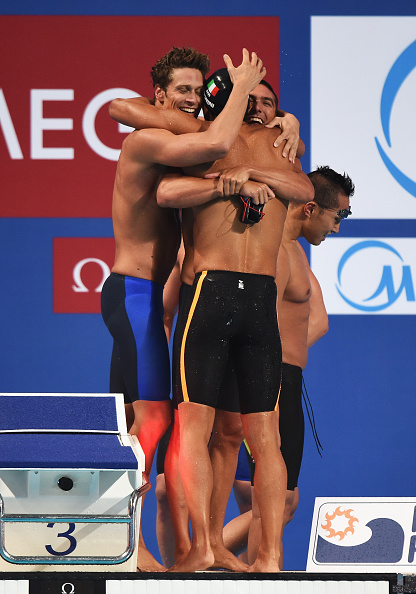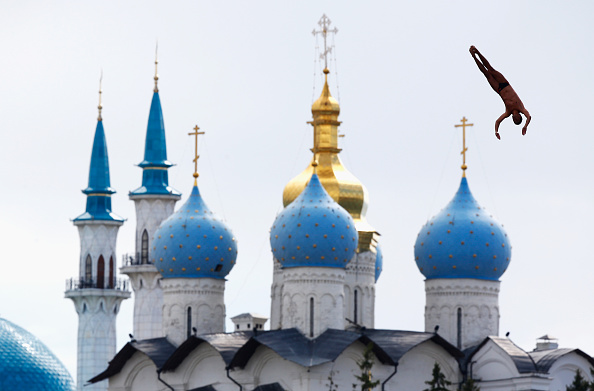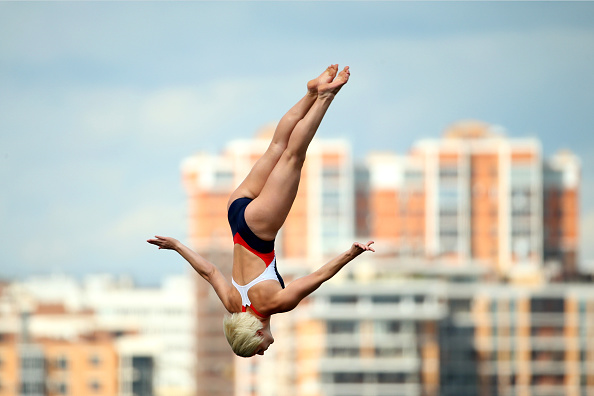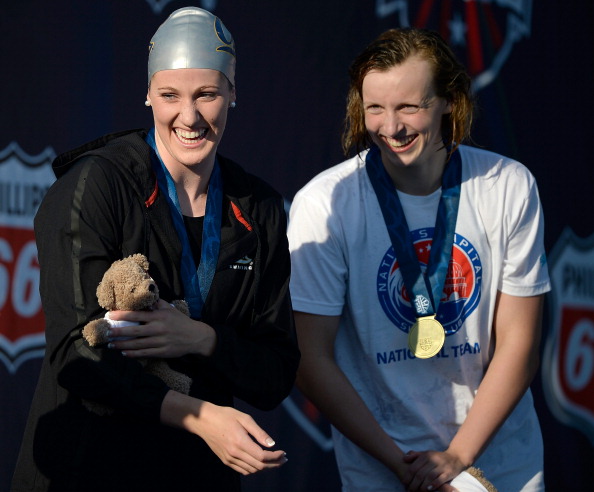KAZAN, Russia — No Michael Phelps but when you have Katie Ledecky, you get records. So maybe the only ones happier than Ledecky after she set a world championships record Sunday night in the 400-meter freestyle was, well, everyone who wondered, exactly, what this meet would be like without Phelps, the one and only.
All sports need big stars, and in the absence of Phelps, beyond doubt the biggest name in swim history, Ledecky showed Sunday — again — why she is one of the most gifted, truly thrilling athletes in the Olympic scene.
Moreover, and perhaps just in time for a world turned too-skeptical about Olympic sports because of story after story of athletes caught using performance-enhancing drugs, track and field again engulfed over the weekend in a potentially wide-ranging scandal, with Katie Ledecky there’s never a doping worry. Take it to the bank: she is 110 percent racing clean.
Ledecky raced to victory in 3:59.13, breaking the world championships record by two-hundredths of a second. Her time, the third-fastest ever, was just a beat or two shy of her own world record, 3:58.37.

Her race marked the much-anticipated highlight of the first of eight nights of racing from Kazan 2015. Also Sunday night:
— In the semifinals of the women’s 100 butterfly, Sweden’s Sarah Sjostrom did set a world-record, going 55.74, breaking the mark of 55.98 that American Dana Vollmer set at the London 2012 Olympics.
— In the second semifinal of the men’s 50 breaststroke, Britain’s Adam Peaty also set a championship mark, 58.18, just moments after South Africa’s Cameron van der Burgh had set the mark at 58.49 in semifinal one. Peaty holds the world record, 57.92, set in April at the British nationals.
— In the men’s 400 free, China’s Sun Yang — who last year served a three-month doping ban — reclaimed his place on the world stage, winning emphatically in 3:42.58. After touching first, he bellowed in exultation and wagged his index finger to remind one and all who, in men’s distance, is No. 1.
At the 2013 worlds in Barcelona, Sun won the 400, 800 and 1500 frees.
For swim geeks, this freaky note: Sun’s time was precisely the same, to the second, that Ian Thorpe hit to win the 400 free at the 2003 world championships.
Speaking to reporters afterward, Sun first played it supremely cool:
“First of all, I would like to offer congratulations to my country. They just won the bid for 2022. I would like to take this opportunity to promote these Olympic Games and to jog attention from media worldwide.”
Then, asked about his doping matter, he delivered a mini-soliloquy — but only after asking first what country the journalist asking the question was from (Switzerland).

“I don’t understand,” he said, “why the media pays this much attention to this. The world always thinks that whenever a Chinese athlete gets a good result, we have used some drugs. For Chinese athletes, we are training very hard, as are athletes in other countries.
“There is absolutely no doubt that … doping cases are happening in other countries as well, for example the Australia team. But I don’t understand why the media pay so much attention and over-promote this story. I think,” he said, “it’s a lack of respect.”
A moment later, he added, “I hope media all over the world can have a fair attitude toward Chinese athletes. Don’t treat us as the enemy. Treat us fairly.”
— As Sunday night’s racing wound to a close, the Australian women’s 4x100 relay team — no allegation of anything amiss — set another championship mark, winning big in 3:31.48, 24-hundredths under the old mark, set by the Netherlands at the 2009 Rome championships. Here the Dutch took second, in 3:33.67. The Americans, with Missy Franklin swimming leadoff, took third, in 3:34.61.
As for Phelps, with 22 Olympic medals, 18 gold:
You think the U.S. effort missed him Sunday? The U.S. men’s 4x100 relay team — a perennial medal contender in an event that is for Phelps virtually a crusade for red, white and blue pride, one in which he typically swims lead-off — finished 11th in Sunday morning’s prelims, in 3:16.01, nowhere near good enough to make the top-eight for the nighttime finals.
That marked the first time, dating to 1973, the American men missed the world championship final of a 4x100 free. Indeed, with one exception, 2001 in Fukuoka, Japan, the Americans had made the 4x100 podium; in that 2001 race, the Americans finished third but ended up getting disqualified for using a swimmer whose name was not on the entry list.
Meanwhile, the Australian men also got shut out; the Aussies finished 13th in Sunday’s qualifying, at 3:16.34.
So another first: Kazan 2015 made for the first worlds at which neither the Americans nor Australians would medal in the men’s 4x100 relay.
To underscore the import of Sunday’s subpar relay performance and the challenge ahead for the U.S. men’s 4x100 relay:
Taking out the 2001 DQ: that 3:16.01 made for the slowest by a U.S. 4x100 relay team at a world championships since 1998, 3:16.69.
It ought to be abundantly clear now to USA Swimming officials that there needs to be, for the relay, this strategy: an A team, the one that swims in the night finals, and an A-minus squad for the morning prelims, the one that at least gets you top-eight. In addition, there needs to be A-plus training and preparation — qualities that clearly were not Sunday in evidence.
Relying on anything else — you need four guys who can swim 48 seconds, consistently — simply won’t do, given the way the rest of the world has caught up.
Consider the eight teams in Sunday’s final: Poland, Japan, Italy, Russia, Brazil, France, Canada and China.
France won, just as in London 2012 and Barcelona 2013, here in 3:10.74. Russia, pushed by a screaming home crowd, grabbed second, in 3:11.19. Italy took third, in 3:12.53, its first 4x100 worlds medal since 2007.

Moreover, the wisdom of keeping Phelps home seriously has to — once again — be questioned. He has done his out-of-the-pool time, part of the deal sparked by his drunk-driving suspension. The value of not having him here, months later and after he has undergone weeks of isolation and reflection that seem life-changing, is — what? Particularly when Phelps, given his import in world-class relays, will be swimming this very same week at the U.S. championships in San Antonio?
Where is the logic? How does not having Phelps here further serve him? Or U.S. interests, swim and Olympic?
There had been great hopes from many in influential swim circles that Phelps and USA Swimming would be able to find a way to get him here to Kazan 2015. Again, all sports need stars. It’s that elemental. And he assuredly would have loved to have been here. In the midst of his self-proclaimed retirement, he sat out the 2013 worlds, in Barcelona — though he was there, at the meet, texting in real time to longtime coach Bob Bowman thoughts on the U.S. relay 4x100 relay as it finished second.
No compromise could be reached, however.
The good news for the Americans: 11th is good enough to make the Rio 2016 relay line-up (top 12).
The not good: U.S. prospects for the 2016 Games in the 4x100 relay can now best be described as a — in a word — situation.
Without Phelps, it was always clear coming into Kazan that expectations would fall on Ledecky, Franklin and Ryan Lochte to command the spotlight for the U.S. team.
Every time Ledecky swims, the world record is at risk, and in races where such marks had been standards for many years, in particular the 400, 800 and 1500. She is due to swim the 200 free here as well.
For anyone else, this would be crazy talk; a world-record possibility in every swim.
Ledecky, though, is so crazy good that she turns races that are something like four, eight or 14 minutes long into incredible theater.
With Ledecky on the blocks, it’s not whether she’s going to win. She’s a near lock to win. The issue now is by how much, and will there be a meet or world record?
In Sunday morning’s prelims, she flirted with the world record through 200 meters, then eased off, treating the final 200 like a training swim. She touched first in her heat in the prelim in 4:01.73, the morning’s fastest time. Jessica Ashwood of Australia turned in the morning’s second-best: it was 2.74 seconds behind Ledecky.
Going into Sunday night, the 400 world record stood at 3:58.37. Ledecky set that mark last Aug. 23, at the Pan Pacific championships in Gold Coast, Australia. Before that, the world record had stood at 3:58.86; Ledecky did that at the U.S. championships just 14 days beforehand.
In case the numbers all get to be too much: last year, Ledecky set the world record, then lowered it again by about a half-second, all within two weeks.
Some more big-picture context:
Camille Muffat of France won the 400 at the London 2012 Olympics. Muffat was among 10 people killed in a helicopter crash in March in Argentina; her death lent additional poignancy to Sunday’s race.
Before Ledecky went off last year, the 400 mark had stood for five years — Federica Pellegrini, 3:59.15, at the Rome 2009 championships, the first women’s 400 sub-4 swim in history. Before that, it had been lowered only five times in the years since Janet Evans went 4:03.85 in September, 1988, at the Seoul Olympics.
Ledecky won the 800 at London 2012.
In Barcelona in 2013, she won the 400, 800 and 1500. She and Sun were named female and male athletes of the meet.
At last year’s Pan Pacs, she won four freestyle events — 200, 400, 800 and 1500 — and added gold in the 4x200 relay.
That’s one way to measure her progression, how ridiculously good she has become.
Here’s another:
Her 400 prelim times at major meets over the past three years: Barcelona, 4:03.05. PanPacs: 4:03.09. Kazan: 4:01.73.
Or how about this:
Going into Sunday's race, of the all-time top-10 performances in the 400, Ledecky held six of them, including five of the top six. All five are under 4 minutes.
On Sunday night, she put herself in position for another world mark. She was a second under world record pace at 200 meters, 18-hundredths under at 300.
On the seventh lap, she slipped just a little bit — 31-flat, her only lap in 31. Coming home, she reached out for a 29.57, good enough for that world championships record, just shy of the world mark.
Ashwood finished third, at 4:03.34. Sharon Van Rouwendaal of the Netherlands took second, in 4:03.02.
It’s a testament to Ledecky’s excellence that when she “only” breaks the world championships record but not the world record itself, she gets asked if she’s disappointed — and if it’s annoying or, in its way, flattering to be asked if she gets disappointed.
“It is very flattering,” she said late Sunday. “You know, it’s a great honor for me that you expect or hope for a world record each time I swim. Because, I guess, that’s based on what I have done in the past.
“That is a pretty neat thing for me. I won’t get annoyed at any of you. You keep doing what you do and I will keep doing what I do.”
Which is race super-fast — 3:59.13, Ledecky said, is “a swim I can be really happy with.”














